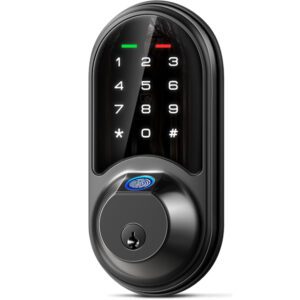When it comes to securing your home, the age-old debate between smart locks and traditional locks is heating up. As technology reshapes everyday life, American homeowners are increasingly asking: Is it time to ditch the old-school key? In this guide, we’ll break down the key differences, benefits, and drawbacks of both systems—and why smart lock benefits like remote access, keyless entry, and cutting-edge security are making waves in modern households.
Why Smart Locks Are Changing the Game
What Makes a Smart Lock “Smart”?
A smart lock isn’t just a fancy gadget—it’s a full upgrade to your home’s security. Unlike traditional locks that rely on physical keys, smart locks use wireless tech like Bluetooth, Wi-Fi, or biometrics to let you control access via your phone, voice commands, or custom PIN codes. Brands like Yale and August dominate the market, offering models that sync with Alexa, Google Home, and even your security cameras.
Pro Tip:
Check out our guide How to Install a Smart Lock in 5 Easy Steps to get started hassle-free.
The Downfalls of Traditional Locks
Outdated Security Risks
Traditional locks have one job: keep the door shut. But let’s face it—they’re not foolproof. From lock-picking to stolen keys, these systems are vulnerable. The FBI reports that 33% of burglars exploit unlocked doors, a risk smart locks mitigate with auto-locking and tamper alerts.
Common Weaknesses:
- Pickable cylinders: Skilled thieves can bypass them in seconds.
- Lost keys: $3 billion spent annually on replacements in the U.S.
- No activity logs: You’ll never know who entered or when.
Top 5 Reasons to Choose a Smart Lock
1. Keyless Entry Systems: Bye-Bye, Keys!
Imagine unlocking your door with a fingerprint or a voice command. Keyless entry systems eliminate the hassle of lost keys and sticky keyholes. Perfect for:
- Parents juggling groceries and kids.
- Airbnb hosts managing guest check-ins.
- Anyone who’s ever locked themselves out (we’ve all been there).
Bonus: Assign temporary codes to dog walkers or contractors—no more hiding keys under the mat!
2. Military-Grade Security Features
Smart locks aren’t just convenient—they’re secure. Features like:
- Encrypted access: Hackers can’t crack these codes.
- Tamper alerts: Your phone buzzes if someone messes with the lock.
- Auto-lock: Doors secure themselves after 30 seconds.
Still worried about hacking? Dive into Are Smart Locks Hack-Proof? Security Features Explained for peace of mind.
3. Seamless Smart Home Integration
Pair your smart lock with lights, cameras, and thermostats for a fully automated home. Examples:
- Lights turn on when you unlock the door.
- Security cameras start recording at entry.
- Thermostats adjust to your “home” mode.
Pro Tip: Renters love portable options like the August Wi-Fi Smart Lock—no drilling required!
4. Remote Control from Anywhere
Stuck at work? Let the plumber in via your phone. On vacation? Check if you remembered to lock up. With smart locks, you’re always in control.
5. Long-Term Savings
Yes, smart locks cost more upfront (100–400 vs. 20–150 for traditional). But consider:
- No rekeying costs: Digital access codes are free to reset.
- Insurance discounts: Some providers reward smart security.
- Higher home value: Tech upgrades attract buyers.
Where Traditional Locks Still Shine (Sort Of)
The Case for Simplicity
Traditional locks work without Wi-Fi or batteries—no tech glitches, no fuss. They’re cheap, easy to install, and ideal for:
- Low-budget homeowners.
- Secondary doors (like basements or sheds).
- Older homes with unique hardware.
But remember: If you lose a key, you’re paying for a locksmith.
Smart Lock vs Traditional Lock: Side-by-Side Comparison
| Feature | Smart Lock | Traditional Lock |
|---|---|---|
| Security | Tamper alerts, encryption | Vulnerable to picking |
| Convenience | Phone/voice control | Requires physical keys |
| Tech Integration | Works with Alexa, Google Home | None |
| Cost | 100–400 | 20–150 |
| Installation | DIY-friendly (usually) | Simple but limited features |
Addressing Common Concerns
“Are Smart Locks Reliable?”
Modern smart locks use industrial-grade materials and encryption. Brands like Schlage and Kwikset prioritize durability, and most include backup keys for power failures.
“Can Smart Locks Be Hacked?”
While no system is 100% hack-proof, smart locks are safer than traditional ones. Learn more in Can Smart Locks Be Hacked? What You Need to Know.
Who Should Upgrade to a Smart Lock?
Ideal For:
- Tech enthusiasts: Love automating your home? This is your next step.
- Busy families: Track kids’ comings and goings via entry logs.
- Frequent travelers: Grant access to house sitters remotely.
Stick with Traditional If:
- You’re on a tight budget.
- Your Wi-Fi signal is spotty.
- You prefer “old-school” simplicity.
Final Verdict: Is a Smart Lock Worth It?
The smart lock vs traditional lock battle isn’t even close. With superior security, keyless convenience, and smart home perks, smart locks are the clear winner for modern living. Whether you’re securing a suburban home or a downtown apartment, upgrading to a smart lock means stepping into the future of home safety.
Ready to make the switch? Explore the Top Benefits of Using a Smart Lock for Your Home and find your perfect match today!



